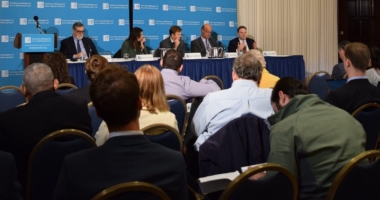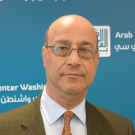
Speakers

Dokhi Fassihian
Director of Middle East and North Africa Program
Freedom House

Andrew Miller
Deputy Director for Policy
Project on Middle East Democracy

Tom Porteous
Deputy Director of Programs
Human Rights Watch
Moderator
Watch Video
Event Summary
Washington, DC — October 23, 2018 — Arab Center Washington DC (ACW), a nonprofit, independent, and nonpartisan think tank that focuses on US policy and developments in the Arab region, hosted a panel discussion on October 23, 2018 at the National Press Club titled “The Khashoggi Affair and Its Political Implications.” The speakers were Dokhi Fassihian, Director of the Middle East and North Africa Division at Freedom House; Tom Porteous, Deputy Program Director of Human Rights Watch; Imad K. Harb, Director of Research and Analysis at ACW; and Andrew Miller, Deputy Director for Policy at Project on Middle East Democracy. Khalil E. Jahshan, Executive Director of ACW, facilitated the event.
Khalil Jahshan welcomed the audience and introduced the speakers. He spoke of Jamal Khashoggi as a friend and advocate for freedom and human rights. He said that Khashoggi’s murder at the Saudi Arabian consulate in Istanbul on October 2 has roiled the international community. Although 18 Saudis have so far been implicated in the crime, Jahshan noted that many questions remain unanswered. He urged an international investigation into Khashoggi’s disappearance and murder, saying that “we owe our friend Jamal Khashoggi a credible and full explanation of what happened to him in Istanbul.”
Dokhi Fassihian said that Saudi Arabia’s longstanding low ranking on the “Freedom in the World” index makes the Khashoggi affair almost unsurprising to those who follow politics in the kingdom. In his final article in the Washington Post, she noted, Khashoggi lamented the lack of press freedom in Saudi Arabia. Further, Crown Prince Mohammed bin Salman (MbS) made it clear early on that only he would be in charge of reforms and that criticism would not be tolerated. As examples, Fassihian referenced MbS’s detentions of royal family members, business executives, and officials at the Riyadh Ritz-Carlton, the wave of arrests of clerics, the arrests of women’s rights activists, and punishments and executions of members of the Shia minority in Saudi Arabia. She said the horrific murder of Jamal Khashoggi provides a test of US leadership; people are waiting to see how President Donald Trump and Secretary of State Mike Pompeo react to the unfolding events and how much pressure they will apply on the Saudis regarding this case. In the long term, Fassihian asserted, it is important for Washington to expect Riyadh to adhere to policies that embrace democracy and human rights as part of its relationship with the United States.
Tom Porteous explained that since the start of the Arab uprisings in 2011, repression and authoritarianism have been on the rise in the Middle East. Saudi Arabia reacted with particularly fierce crackdowns on all forms of dissent or calls for reform. The Saudi government’s main motivation, he said, was to silence any political opposition and criticism, inside or outside the kingdom. Porteous characterized Saudi Arabia’s role “as a regional champion of repression and autocracy,” one that has targeted exiled Saudi dissidents like Jamal Khashoggi, bailed out the repressive military leadership in Egypt in the 2013 coup, and supported Bahrain’s violent suppression of protests. He suggested that many in the West have willfully ignored Saudi Arabia’s acts, with countries like the United States actively supporting the catastrophic Saudi and Emirati war in Yemen and not objecting to arrests of women’s rights advocates like Loujain al-Hathloul. Human Rights Watch, Porteous stated, has called for an investigation by the United Nations to understand Saudi Arabia’s role in the Khashoggi murder and to identify all who are responsible. In seeking a false narrative to obscure the facts, he explained, the Saudis want to limit the damage of the Khashoggi affair through lies. International actors now have an opportunity to demand full disclosure; however, he asked, will they decide to “tough it out” and “sweep it [the truth] under the carpet”? Without Saudi accountability for Khashoggi’s killing, he maintained, the message to the world would be that freedom of expression is not valued.
Imad Harb described Saudi Arabia as a rentier society featuring a ruling bargain in which the loyalty of the ruled is exchanged for the largesse of the ruler. With MbS’s increasing repression and intimidation of any opposition, the current moment allows consideration of how the killing of Jamal Khashoggi will reflect on the economic and social reforms in the kingdom today. Despite the crackdowns, Harb said, the truth about Khashoggi will eventually be revealed and there will be a reckoning. Economically, Saudi Arabia has aimed to diversify its economy away from hydrocarbons and toward investments, so it needs good international financial relations. He asked, can Saudi Arabia continue to conduct the war in Yemen in light of the Khashoggi killing and the crisis of confidence in MbS, domestically and internationally? If Saudi Arabia is not exonerated from this crime, will the US Congress finally change its stance on supplying weapons for the kingdom to prosecute its Yemen war? As for the issue of Palestine, Harb asked if the Trump Administration will now look at MbS as too weakened to assist in the yet-to-be-announced peace deal. The big winners in this situation are Iran and its supporters, he concluded, which are pleased today that the Khashoggi affair has enfeebled Riyadh politically.
Andrew Miller characterized the US reaction to the Khashoggi assassination as extraordinary, especially in Congress, where there has been a strong response by both Democrats and Republicans through letters to the president and the discussion of sanctions on Saudi Arabia using the global Magnitsky Act. The Trump Administration, by contrast, wanted to believe Saudi Arabia’s story. Further, it does not want to stop arms sales to the kingdom or to hold MbS accountable for directing the Khashoggi operation; Miller opined that if Trump and his administration are given the room, they would find a way to avoid a decisive response to this problem. To them, the Saudi role in regional cooperation is valued, especially in the Palestine-Israel issue, on military support in Syria, and as a bulwark against Iran. Miller said that “justice for Jamal is important” intrinsically as well as for other regime critics throughout the world. He added that the US-Saudi “security for oil bargain” is no longer compelling for both sides, so the bilateral relationship now needs recalibration. He suggested that Washington could consider expanding the relationship beyond security and economics; disentangle from the war in Yemen by restricting arms sales and support; avoid the temptation to change its focus from helping to mitigate Riyadh’s external security threat to addressing the kingdom’s internal security threat; and reassert control over the bilateral relationship by establishing clear boundaries and expectations that inform US diplomatic decisions.
Event Photos


